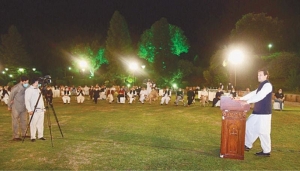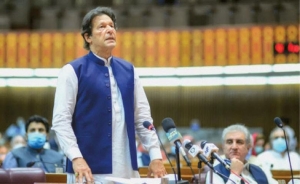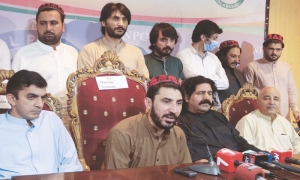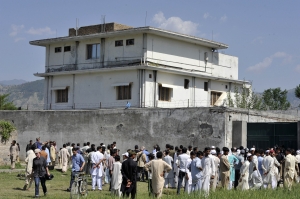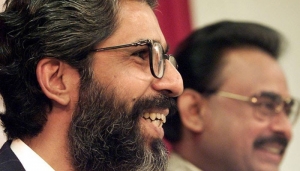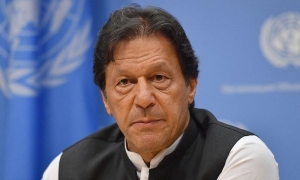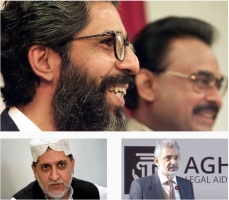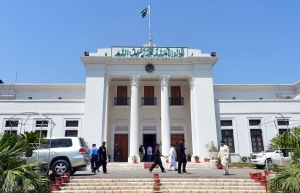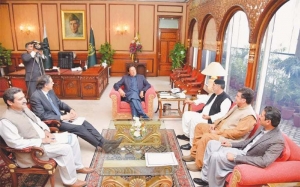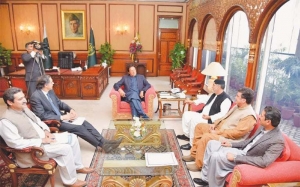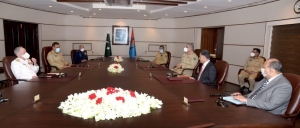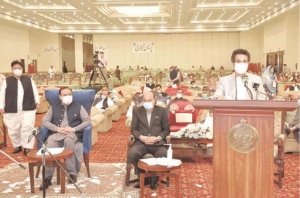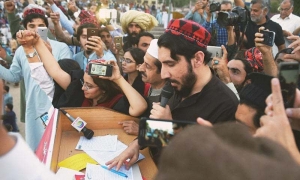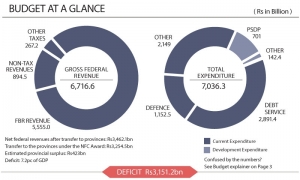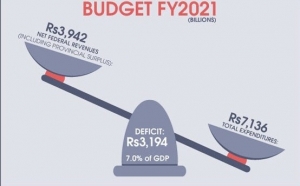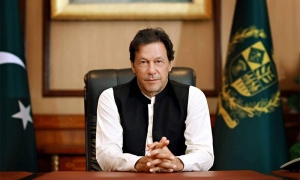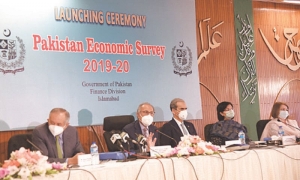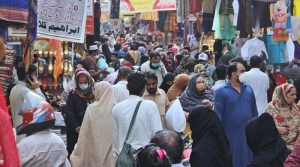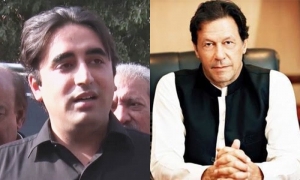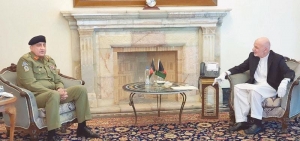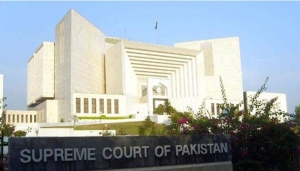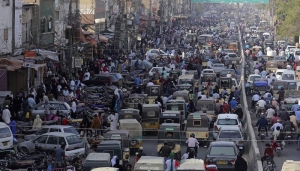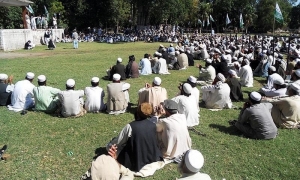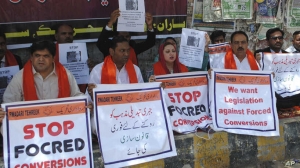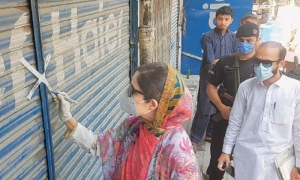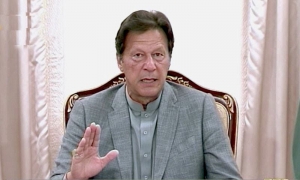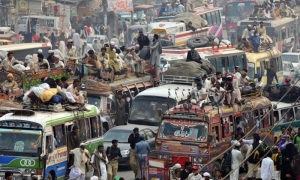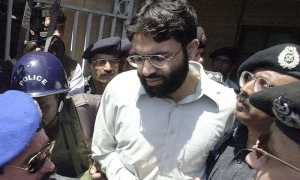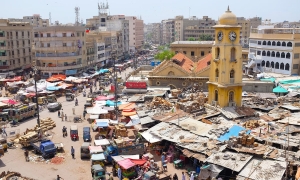|
In Focus
THE SINDH BUDGET
Focus on Govt employee salaries, social protection, health, education, and locust control
On 17 June, Sindh finance minister and CM Syed Murad Ali Shah presented the Rs1,241.13 billion budget (with a deficit of Rs18.38 billion) for FY2020-21 in the provincial assembly.
CM Shah announced a 10 per cent increase in govt employees' salaries; social protection COVID-19-related pro-poor package called "Social Protection and Economic Sustainability" worth Rs34.2 billion; a 16 per cent increase in Health allocation; 10 per cent increase for the education sector; Rs440 billion earmark for locust control; and risk allowances for health practitioners and personnel fighting the pandemic.
The budget estimates Rs39.19 billion for capital expenditure, Rs232.94 billion for development expenditure (only 33 per cent earmarked for development projects), and Rs968.99 billion for non-development expenditure (with a restriction of seven per cent for the latter). Mr Shah also said that overall federal receipts for this year were abridged by nine per cent or Rs71.72 billion in comparison to FY2019-20. ("Only 33% of local govt funds allocated for development in Sindh," The Express Tribune, 18 June 2020)
The budget 2020-21 does not introduce any new taxes. It also reduces the Annual Development Plan (ADP) to Rs232.9 billion (a drastic 18.8 per cent slash). The reduction has been due to low inflows from the Center. As reported by The Tribune, the budget earmarks Rs21.08 billion for education (with Rs451m dedicated for distance learning); Rs23.5 billion for the health sector; Rs17.02billion for agriculture and irrigation (in addition to Rs14.14 billion of foreign project assistance); Rs666 million for the Sindh police and province's jails; Rs12.17 billion for the local government department; Rs233 million for social welfare (in addition to Rs3.91 billion under ADP and Rs3.3 billion foreign project assistance); Rs120 million for women's development (and Rs117 million of foreign project assistance); Rs1 billion for energy department (along with Rs3.3 billion in foreign project assistance); and Rs6.46 billion for the transport sector (along with Rs5.68 billion of foreign project assistance). ("Sindh slashes development funds by 18.8%," The Express Tribune, 18 June 2020) ("Sindh sets aside Rs451 million for distance learning," The Express Tribune, 18 June 2020) ("Sindh earmarks Rs14.8b for agriculture," The Express Tribune, 18 June 2020)
Sindh's ADP 2020-21 allots 85 per cent to ongoing schemes and remaining to new ventures. The government also expects Foreign Projects Assistance to contribute Rs54.6 billion and Federal PSDP to contribute Rs8.3 billion to 10 ongoing schemes. ("Budget 2020-21: No new taxes as Sindh presents Rs1.24tr budget," Dawn, 18 June 2020) ("BUDGET 2020-21: Sindh reduces ADP to Rs232.9bn," Dawn, 18 June 2020)
Meanwhile, Sindh Assembly's Opposition, Grand Democratic Alliance, and the PTI conducted a noisy protest.
In Brief
COVID-19
Coronavirus cases surge in Punjab
The Fatalities count has been on the increasing range in Punjab. So far 1,149 deaths with confirmed cases of 58,239 only in the province of Punjab, second highest is recorded in Lahore with 1,642 new cases. According to the health department, 375,523 tests have taken place and 17,780 cases have recovered till now. ("68 more die from corona in Punjab," The News International, 18 June 2020)
INTERNAL
PM calls for 18th amendment to be revised
On the 18th amendment, PM Imran Khan stated that he had no intention of rolling back the devolution plan but clearly stated his view of reviewing the 10-year-old reforms which, he said "needed to be fixed" adding that there are several things that are not practical with it. Further, also adding that concept of the National Finance Commission (NFC) Award also "carries anomalies". (Imran Ayub, "18th Amendment needs to be 'reviewed': PM," Dawn, 18 June 2020) While addressing media in Karachi, he added that some federal subjects were wrongly devolved to the provinces under the 18th amendment, thus turning the chief minister into a dictator, to which he based his argument that some revision needs to be made. ("18th Amend turned CM into dictator: PM," The News International, 18 June 2020)
ECONOMY
Gwadar Port concession offered only for 20-year tax holiday
On 16 June, the maritime affairs secretary disclosed that the original Gwadar Port concession agreement offered only 20-year and not 40-year tax holiday to port operators and that there was no provision for extending the tax concession to sub-contractors. This disclosure came after the Senate Standing Committee on Finance, had asked the maritime affairs secretary to appear before it as a day earlier the Federal Board of Revenue (FBR) told the committee that it proposed up to 40-year tax holiday for Gwadar Port operators, its contractors, and sub-contractors on the recommendation of the maritime affairs ministry, however, maritime affairs secretary revealed that there was no clause in the port concession agreement that guaranteed 40-year tax holiday and also the sub-contractors were not eligible for any tax concession. (Shahbaz Rana, "Gwadar agreement: No clause for 40-year tax holiday," Dawn, 18 June 2020)
ON BUDGET 2020
Uncertainty in the Pakistan Budget
The editorial in Dawn identifies two major challenges to the budget and the economic survey. Firstly, the target of every budget is to meet its revenue, but, in the case of Pakistan, there is no revenue plan to collect back the lent trillions to the provinces. The National Finance Commission award was Rs3.7tr but, the expenditure on debt servicing and defence alone has summed to Rs4.235tr. Therefore, it reduces the possibility of payback from the states as they cannot afford to pay creditors or armed forces or salaries. Secondly, the blame game between political party's makes the discussion of the budget strangled. One has to know that any decision was taken for the economy; it always times to show effect. So, in case of quick growth can disappear quickly as well. If this growth was through borrowing or a trade deficit, then it doesn't square to the revenue. The borrowings in the last two years have equated to the borrowings of the last ten years, but the government does not have an explanation for this. The only difference is the shift in nature from short term to long term, thus with increased debts and no revenue to meet it clearly states the ambiguity of the Pakistan economy in the long run. (Khurram Husain, "Budgeting on hope," Dawn, 18 June 2020)
The cutdown in the budget for Education and Health sector
The budget released lacks two vital factors that impact the living of people in Pakistan. It is the education and health sectors, with 2,650 deaths till now the budget has seriously fallen short in allocating budget to these fields. Although the government budget is needed in other sectors like debt service and defence, the cutdown to education and health sector seem drastic without means to meet the UN standards and marks the lowest in South Asia. The opinion gives the example of the State of Kerala for building its literacy rate and the strong efficiency of Cuba and Vietnam countries which were under severe sanctions but have excelled in healthcare with the capacity to provide facilities to 87 per cent of its people. Therefore, the Pakistan government must reconsider these examples and allocate budget to make people aware and keep them safe. Additionally, it should take measures to give technological facilities to help students for higher learning and better health equipment for people. (Kamila Hyat, "Where do the people really stand?" The News International, 18 June 2020)
Abid Hasan redrafts the budget of Pakistan
An opinion in the News International titled "Cleaning up the budget" by Abid Hasan, starts by saying that the "Prime Minister has not displayed the leadership to pull Pakistan out of the crisis." The first argument placed is the federal government has completely become dependent upon the borrowings, and its expenses have doubled in recent years. Secondly, the budget is deeply flawed with bad taxes and wasteful expenses. Thirdly the challenge of drafting a budget at the time of crisis has been met shortly by the economic team and seems like a usual business budget. Abid Hasan presses on to impose a one-time 'Corona Tax' on the elite group. This contains five pointers, first, a one per cent tax on all types of assets to be levied exceeds 10 million rupees because Pakistan has the lowest property taxes in the world. Second, a 10 per cent tax to be put on inheritance over 10 million rupees. Third, regardless of holding period a 30 per cent Capital Gains on the sale of shares over 10 million rupees and property valuing above 20 million rupees. Fourth, 30 per cent tax on the dividends that exceed one million rupees. Finally, a 'symbolic' 50 per cent tax on salaries of lawmakers and senior military officers and also to cut down the funding of cars and perks for a year. Through this, the country can achieve at least 300-350 billion rupees. This will also make the elites learn that without helping the poor, the survival of the rich is also narrowed. (Abid Hasan, "Cleaning up the budget," The News International, 18 June 2020)
On Pakistan Budget 2020, also read...
"Budget without a plan," Dawn, 14 June 2020
"Budget 2020-21," The News International, 13 June 2020
Mubarak Zeb Khan, "Budget 2020-21: Finance bill shows all relief, no clear revenue plan," Dawn, 13 June 2020
Farhan Bokhari, "Future without vision?" The News International, 17 June 2020
Senator A Rehman Malik, "Covid-19 friendly, public unfriendly budget 20-21," The News International, 17 June 2020
"A rolling budget?" The Express Tribune, 13 June 2020
Hasaan Khawar, "Homeopathic budget," The Express Tribune, 16 June 2020
Abid Hasan, "Cleaning up the budget," The Express Tribune, 18 June 2020
Khurram Husain, "Budgeting on hope," Dawn, 18 June 2020
Kamila Hyat, "Where do the people really stand?" The News International, 18 June 2020
ON INDIA
Indian shelling across the LoC kills four civilians
On 17 June, a woman and three young boys were killed while another person was injured in two areas of PoK by Indian shelling from across the Line of Control (LoC). The incident took place while the victims were busy doing their daily routine. Further, since the shell exploded very close to the victims, there was hardly any part of their bodies that had not been pierced or cut by the shrapnel. The latest casualties have pushed the death toll to 12 in PoK for the current, while at least 102 other civilians have sustained injuries. PoK President and Prime Minister have strongly condemned "unprovoked" ceasefire violations. (Tariq Naqash, "Woman, three boys killed in Indian shelling," Dawn, 18 June 2020)
Will continue foiling Indian designs against Pakistan: ISPR
The Inter-Services Public Relations (ISPR) released a press statement stating that the army would continue to foil any plans against Pakistan by India and will continue exposing the human rights abuses in occupied Kashmir along with terrorist links. Emphasis was also made on diplomatically and politically unmasking India at the international forums. Further, the strategy adopted seems to resemble the government plan for challenging Indian credentials as it prepares to take up a seat at the United Nations Security Council as a non-permanent member for the 2021-22 term. (Baqir Sajjad Syed, "Army vows to continue foiling Indian designs," Dawn, 18 June 2020)
ON INDIA-CHINA BORDER TENSIONS
India must learn to peacefully coexist with all its neighbours in the spirit of harmony and mutual respect: Editorial
An editorial in the Dawn titled "China-India clash," is critical of the recent development that has occurred along the LAC between China and India. Although there was no firing from both sides, the clash resulted in deadly fatalities. Given the recent development along the borders, the editorial is critical of India's role stating the country has a history of bullying its neighbours and trying to play regional hegemon. Further, it stated that although India may harbour superpower delusions and throw its weight around the region, bur militarily and economically, India cannot be compared to China who is far superior, thus India proceeds with far more caution on this front. Further, India must learn to peacefully coexist with all its neighbours, including solving all disputes through dialogue. The editorial concludes by stating that in a region with three nuclear states, war is not an option, suggesting that if India pursues the policy of live and let live, it would be a much better option for South Asia. ("China-India clash," Dawn, 18 June 2020)
India and China agree to abide by existing bilateral agreements after deadly clash
After the deadly clashes on the Sino-Indian boundary in Ladakh, both foreign ministers from India and China held a telephonic conversation agreeing to abide by existing bilateral agreements to ensure peace and tranquillity on their disputed Himalayan border. Additionally, they "agreed that the overall situation would be handled responsibly, and both sides would implement the disengagement understanding of 6 June." Further, both sides have agreed that neither side would take any action to escalate matters. (Jawed Naqvi, "India, China agree to restore tranquillity on border," Dawn, 18 June 2020)
Foreign Minister comments on India-China
The Foreign minister of Pakistan has commented that "India's Hindutva agenda and intransigence will destroy peace and security in the region." He said that it was the stubbornness of India that has caused the border problem and the Chinese have been easy to settle the issue. As per the minister, the 3500 km area of Tibet and Ladakh was under China and if India crosses over it's not allowable. (Shafqat Ali, "India's Hindutva agenda flaring China-India tension: Pakistan," The Nation, 18 June 2020) The blame has come upon the Hindutva Philosophy of the government of India for the border problem and stated that "Whenever India follows this [Hindutva] ideology and shows this stubbornness, situation in the region will deteriorate". He mentioned that violations in the Line of control must get the attention of the international community. (Anadolu Agency, "Pakistan throws weight behind China on border tensions with India," The Express Tribune, 18 June 2020)
Border tensions in Galwan Valley
The standoff between India and China seems to be prolonged without any settlement, and Galwan Valley has become the hot spot for skirmishes. The Hindu Nationalist government has turned more assertive with all its neighbours, especially Kashmir. The editorial states that India and China being two powers with military capabilities can provoke war and diminish peace in the region. It suggests that this situation must not arise and to be avoided at all means. ("China-India standoff," The News International, 18 June 2020)
|


